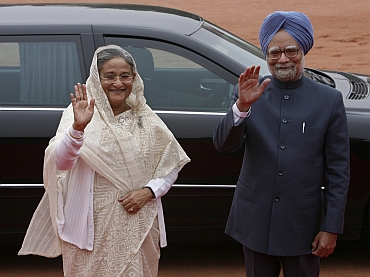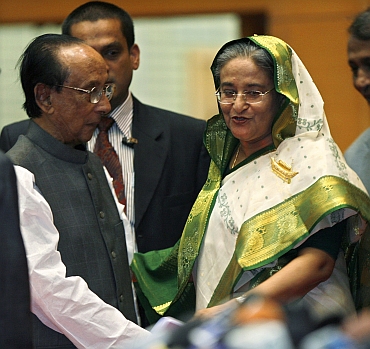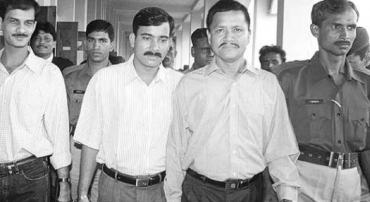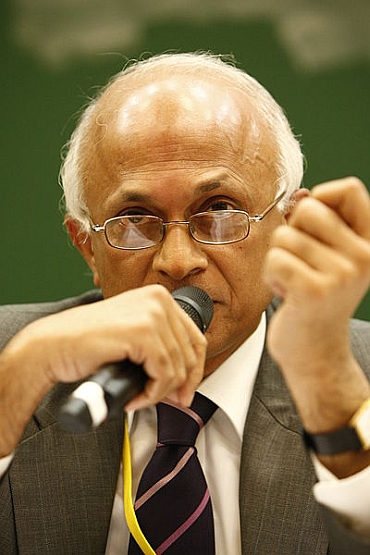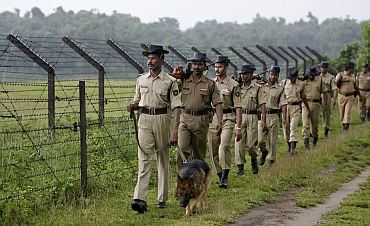 | « Back to article | Print this article |
What to expect from Dr Singh's Bangladesh visit
However, the visit has been clouded by the uncertainty over the signing of an accord on sharing of waters of Teesta River following strong reservations expressed by West Bengal Chief Minister Mamata Banerjee who pulled out of the visit.
Diplomatic sources said the two countries are also considering signing of a long-term framework agreement for forging close bilateral relations.
Bangladesh and India had signed a 25-year Treaty of Friendship, Cooperation and Peace on March 19, 1972. The two governments, however, declined to renegotiate or renew the treaty when it expired in 1997. The framework of agreement, the sources said, will provide a structure, and identify priorities of the relationship.
Click NEXT to read further...
On PM's Dhaka agenda: Security, boundary issues, water resources
During his visit, Dr Singh will hold talks with his Bangladesh counterpart Sheikh Hasina, call on President Zillur Rahman and hold meetings with opposition leaders Begum Khaleda Zia and Jatiya Party chief Hussain Muhammed Ershad, the former military dictator.
Agreements on land boundary, water resources, market access and power purchase are crucial for Bangladesh while transit and security are prime concerns of India.
Extradition pact is likely to be inked
Top United Liberation Front of Asom leader Anup Chetia, now in Bangladesh after having served out his sentence, could be the first to sent back to India under the new accord.
The two countries are likely to sign agreements, protocols, and memorandums of understanding on withdrawal of water from Feni River by India for a drinking water project and a 20-year agreement on purchase of 250 megawatt of power by Bangladesh from India at a preferential rate. Bangladesh might purchase another 250 MW power at the international market rate.
The two countries are likely to sign a package protocol under the 1974 Mujib-Indira Land Boundary Agreement which will deal with five legacy issues -- exchange of enclaves and adversely possessed land, demarcation of 6.5 km of un-demarcated border, allowing Bangladeshis to use "Tin Bigha Corridor" for 24 hours, and finalisation of a strip map.
'India-B'desh ties important for stability northeastern states'
The maiden bilateral visit by Dr Singh -- and the first by an Indian Prime Minister in 12 years-- aims at consolidating the process set in motion during the landmark visit of Hasina to India in January, 2010, to craft a new paradigm relations, said Foreign Secretary Ranjan Mathai ahead of the visit.
In a statement prior to his departure for Dhaka, the prime minister said India's partnership with Bangladesh was important for the stability and prosperity of northeastern states.
Significantly, Dr Singh will be accompanied by chief ministers of four northeastern states-- Assam, Tripura, Meghayala and Mizoram-- in his trip to Dhaka.
Protection of Royal Bengal Tiger protocol to be signed
Bangladesh and India are also likely to sign MoUs on cooperation on renewable energy, telecast of programmes of Doordarshan and state-owned BTV, cooperation in fisheries sector and cooperation between Dhaka University and Jawaharlal Nehru University in New Delhi.
An accord on allowing transit to Nepal through Rohanpur (Chapai Nawabganj) in Bangladesh and Singabad in India might also be signed. There is also the possibility of signing of an agreement on railway connectivity between Akhaura and Agartala, alignment construction of which is nearing completion.
India's pressing issue of transit is expected to be signed under existing Trade Agreement between the two countries. Under it, three separate protocols on use of Chittagong and Mongla seaports of Bangladesh and roads and railway are on the cards.
Both the countries would make arrangements for the use of their waterways, roadways and railways for commerce between the two countries for passage of goods between mainland India to its northeastern states through Bangladeshi territory.
Signing deal on land border on the cards
The signing of a deal on land border, keeping in view the spirit of the 1974 Land Boundary Agreement, will include demarcation of 6.5 km un-demarcated border, exchange of 162 enclaves (51 Bangladesh's and 111 India's), exchange of adversely possessed lands, and allowing Bangladeshis to travel 24 hours between Dahagram-Angarpota enclaves and Patgram through the "Tin Bigha Corridor".
As per the 1974 Mujib-Indira agreement, India will retain the southern half of South Berubari Union No 12 and the adjacent enclaves measuring 2.64 square miles approximately, and in exchange Bangladesh will retain Dahagram and Angarpota enclaves.
India will lease in perpetuity to Bangladesh an area of 178 metres x 85 metres "Tin Bigha Corridor" to connect Dahagram with Panbari Mouza (PS Patgram) of Bangladesh.
At present, Bangladeshis in Dahagram and Angarpota enclaves are allowed to mainland Bangladesh from dawn to dusk every alternate hour.